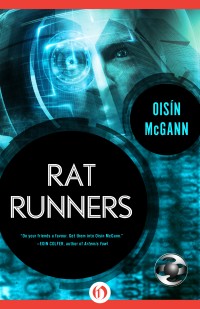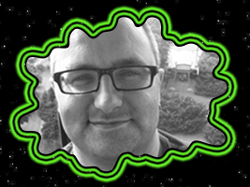Welcome back to The Pop Quiz at the End of the Universe, a recurring series here on Tor.com featuring some of our favorite science fiction and fantasy authors, artists, and others!
Today we’re joined by Oisín McGann, a writer and illustrator who lives somewhere in the Irish countryside. Before becoming an author, he worked as a freelance illustrator, serving time along the way as a pizza chef, security guard, background artist for an animation company, and art director and copywriter in an advertising agency.
McGann has written several novels for young adults, including the Wildenstern Saga, a steampunk trilogy set in nineteenth-century Ireland, and the thrillers Strangled Silence and Rat Runners—all available now as ebooks from Open Road Media.
Join us as Oisín suggests a Muppet fanfic pairing that will either leave you laughing or cringing!
Please relate one fact about yourself that has never appeared anywhere else in print or on the Internet.
One of my earliest commercial illustration jobs was a series of Power Ranger books, while I was working in a studio with a team of illustrators in Dublin. It was a sub-sub-sub-contract and a LOT of people had a say in the illustrations. It remains one of the worst projects I’ve ever worked on. The art director at the time had to drop out to avoid a nervous breakdown and I took over the role. Never have I heard so much foul language directed at ‘artwork’ (and I use that term in the loosest possible sense) as there was in the studio over that period. AND we never received a single copy of any of the books. Bastards.
Describe your favorite place to write.
I work in a studio at home at a large pair of stand-up desks I made to stop me spending so much time sitting on my arse. I can write in the notebook anywhere—I move around a lot promoting the books, and I do like sitting in a café, people-watching and pondering life, the universe and everything. But once I get down to typing, I prefer to be settled rather than working on a laptop. I’m particular about my keyboard too. I like my ergonomic one for any long stretch at writing. The same goes for the illustration—I can sketch anywhere, but I need my gear around me to do any finished stuff.
 You wake up tomorrow morning as the antagonist in your book: what do you do to change the ending for yourself?
You wake up tomorrow morning as the antagonist in your book: what do you do to change the ending for yourself?
As Nimmo in Rat Runners? I’d tell Watson Brundle to hide his own damn case and join me in getting out of the building before that Safe-Guard shows up. Just so he doesn’t end up getting, y’know… murdered and the secret of his brundleseed is lost forever. We seriously need an instruction manual for those things.
Having finally established communication with a distant alien species, what’s the first thing that we should tell them about Earth/humans?
Be patient with us. We’re not entirely rational, but most of us mean well.
If you were secretly going to write fanfic (or, even better, slashfic) about any two characters, who would they be?
Statler and Waldorf in The Muppet Show. Those guys have seen some stuff and must have some serious history.
What was your gateway to SF/Fantasy, as a child or young adult?
That’s a hard one. The Narnia stories, The Hobbit and then The Lord of the Rings and Jules Verne were definitely an early influence, but I read Professor Branestawm before that and they were technically science fiction. There were the comics, of course; I read 2000 AD for a few years and that had a big effect on my work, especially the illustration. I read a lot of film adaptations (or originals with covers from the films) and short story collections without paying much attention to the writers – people I’d later learn about in other contexts, such as Asimov, Philip K Dick, Stanislaw Lem and Ray Bradbury. Stephen King’s horrors and Louis L’Amour’s westerns might not be SF/Fantasy, but they all contributed. To be honest, I can’t remember a time when I didn’t read this kind of stuff.
If you could choose your own personal theme song to play every time you enter a room, what would you pick?
Copland’s ‘Fanfare for the Common Man’. Though it would be more for those mornings when I get up feeling like the living dead. For entering a room, you might have to move slowly though, to give it time to build. For an entrance, it’d probably be better to go with ‘Revelate’ by the Frames.
Strangest thing you’ve learned while researching a book?
Blurting out the weird stuff I learn on my trawling trips is probably the one thing most likely to end my marriage and there’s just too much to choose from. However, I wrote two different stories about Irish soldiers in the First World War last year for two different anthologies. I learned some pretty astonishing facts while reading up on the subject. Over 200,000 Irish soldiers served in the British army and it’s estimated that about 30,000 were killed—or nearly 50,000 if you count those in other armies. That’s on a par with what America lost in Vietnam (and look how scarred they were by that), but in a country with a population of only about three million. The reaction of those left behind was very different too. Because of the political climate, the new Irish government hardly acknowledged the Irish losses in the war, or the men who returned damaged and shell-shocked. Fighting with the British was regarded by many as a shameful act. Even the families of these men would often avoid talking about their involvement. There was a cultural void in Ireland where the trauma of this war should have been and it only started being filled many decades later.
List three things you’d like our readers to know about you and your work.
I write and illustrate for all ages of reader, a conscious decision I made from the start that I wouldn’t get boxed in working in one genre or on one kind of story. More than thirty books later and I haven’t lost any of my passion for the medium. I write for the young because there were particular stages in my life when stories blew my mind and I want to have the same effect on others.
Every now and again, my wife will be reading something of mine, when she’ll stop and ask: ‘Are you in the company of other people while this stuff is going through your head?’ I regard this as a good sign.
When I first got published, I fully intended to be a reclusive writer—living in a cabin in the hills, running around with a shotgun telling people to get off my land. Then I went to try and find my first books in a bookshop and found them shelved out of sight in the wrong section. That was when I found out that making a living as a writer involves something akin to life as a travelling salesman. I still dream about that cabin in the hills.










